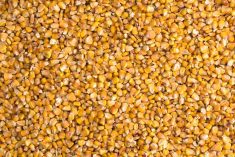After months out of international grain markets and payment hurdles, Iran is now seeking at least 300,000 tonnes of milling wheat to help satisfy major import needs due to a poor domestic harvest, traders said Monday.
Iran has to import 7.5 million tonnes of wheat this year, President Hassan Rouhani said in September, in what international traders had said was a surprisingly large upward revision of initial market projections.
One trade source said Iran’s Government Trading Corporation (GTC) purchasing agency is seeking up to 400,000 tonnes and has also been inquiring about buying U.S.-origin wheat.
Read Also

U.S. grains: Wheat futures rise on supply snags in top-exporter Russia
U.S. wheat futures closed higher on Thursday on concerns over the limited availability of supplies for export in Russia, analysts said.
“The Iranians have a large import requirement as their crop seems to have been disappointing,” one trader said.
Another trader said GTC were seeking consignments with shipment spread over coming months.
“It seems that payment facilities in the U.S. mean the grain should be shipped from U.S. ports,” the trader added.
The European Union and the United States have imposed sanctions aimed at discouraging Tehran’s nuclear program. Iran insists its atomic program is for peaceful purposes.
Frozen funds
The sanctions do not target food or animal feed shipments, but financial measures have frozen Iranian companies out of much of the global banking system, hindering deals for food imports. But traders say frozen bank accounts can be used to pay for food and animal feed imports.
“It is difficult for outsiders to assess Iran’s harvest but neighbouring Pakistan’s wheat crop was poor and Iran’s seems to have been disappointing too,” another trader said, adding there was also talk that Iran had been helping ally Syria with food supplies.
Iran’s imports can fluctuate widely from year to year due to erratic domestic harvests, but imports for 2013-14 are forecast at four million tonnes by the U.S. Department of Agriculture.
Despite hostility between the two countries, Iran has in past years made substantial purchases of wheat from the U.S. In March 2012 Iran made a large purchase and was also in talks about buying U.S. wheat in March 2013.
Iran was last active on international markets in July, picking up at least 50,000 tonnes of milling wheat — adding to over one million tonnes snapped up from international markets beforehand as Tehran sought to boost grain reserves.
There is unconfirmed market talk that Iran has bought a shipment of about 60,000 tonnes of German milling wheat in recent weeks for shipment from a German Baltic Sea port.
Rouhani has sought to get the economy back on track after sanctions had slashed oil revenues and added to turmoil for its rial currency.
Some traders reported new intermediary companies making inquiries about wheat purchases apparently on behalf of the Iranian government.
“They are looking for professional guys willing to do the business on their behalf and they still need cargoes of wheat,” a Middle East-based trade source said.
“At the end of the day it is for the state even if it is going through private buyers. There is a sense that Iran is looking to buy and despite the talks with the West there is still a lack of trust and perhaps a concern that if an agreement is not reached they could have their funds blocked again.”
Iran also approached Kazakhstan and other Caspian Sea suppliers earlier this year for fresh wheat deals.
“Iran is still bringing in small quantities every week through the Volga and Caspian Sea. There is no issue at the moment with payment problems,” a European trade source said.
Iran also issued a tender last month to buy phosphate- and potash-based fertilizer, the first tender in two years, in what traders said might be a sign of easing sanctions.
— Jonathan Saul and Michael Hogan report for Reuters from London and Hamburg respectively. Additional reporting for Reuters by Ron Bousso.














